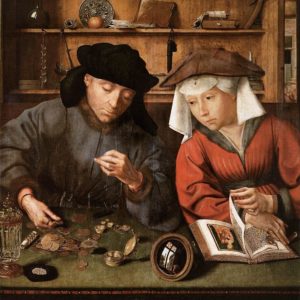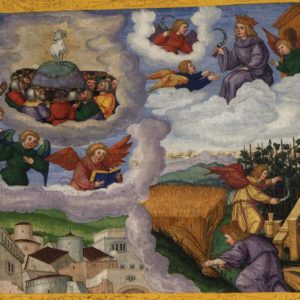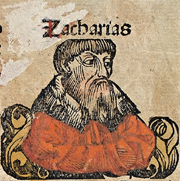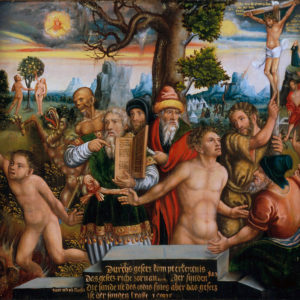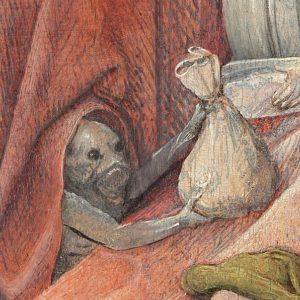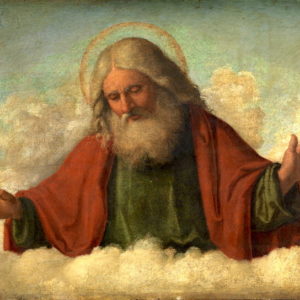Among the singer-songwriters who emerged in the latter part of the 1960s, Leonard Cohen was something of an oddity: a musician with a disdain for secularism and a respect (and a yearning) for religion in general, and Jesus Christ in particular.
Author: Joe Heschmeyer
The New Economics
There was a time, not long ago, in which liberals could be counted on to defend the rights of workers, just as conservatives would the rights of business owners. Those days are over. This is the story of how workers (and business owners) were betrayed by our rampant consumerism.
The Idolatry of Anxiety?
Given the rising tide of anxiety over the election and current events, I think it’s worth discussing the idolatry of anxiety. What does it mean to say that anxiety is a form of idolatry? And how do we rid ourselves of this subtle idolatry?
Six Biblical Passages to Revolutionize Your View of Prayer and Heaven
Protestants tend to be opposed to praying to the Saints and Angels for two reasons: (1) it’s offensive to the dignity of God, since we’re going to someone besides Him; or (2) it’s a waste of time, since we can go directly to God. This hints at the underlying issue – that Catholics and Protestants tend to think of prayer and Heaven very differently. So the core question ought to be: is the Catholic vision of prayer and Heaven true?
Answering 6 Arguments Against the “Apocrypha”
Protestant Bibles have seven fewer books than Catholic Bibles. These seven books are called “the Deuterocanon” by Catholics, and “the Apocrypha” by Protestants (although, confusingly, they also use “the Apocrypha” to refer to several other books, ones that are rejected by Catholics and Protestants alike).
So what’s the basis for the Protestant rejection of these books? Matt Slick, at the popular Protestant website CARM (Christian Apologetics & Research Ministry), offers six reasons, each of which turns out to rely upon lies, deceptions, or double standards.
Suffering and the Sanctity of Life: Why We Don’t See Eye-to-Eye on Abortion and Euthanasia
Is it wrong to take an innocent human life if you can do it without inflicting pain? What about if killing the person reduces the amount of pain that they’re in?
In the debates about both assisted suicide and abortion, it’s common to see two incompatible camps emerge. Despite all of the yelling and nastiness between the two sides, there are people in both camps who are trying to do the right thing. Frequently (not always), the problem is that they’ve simply got two incompatible moral codes. One side looks at the reduction/cessation of suffering, while the other side is rooted in a view of the inherent sanctity of human life. So who’s right, and how can we know?
Does God Owe Us Salvation?
Does God owe us salvation? Yes, if Protestant theologians (from the Reformation down to today) are right. No, if salvation is a free gift, as the Bible says.
3 Surprising Lessons from Jesus’ Weirdest Parable
The weirdest and most troubling of Jesus’ parables is almost certainly the parable of the dishonest manager in Luke 16, in which Jesus presents a parable of a manager who, upon being fired, exploits his position to cut deals with his master’s clients so that he can try to leverage this into a job with them. Rather than being justly furious, the master *praises him* for his ingenuity.
What on earth is going on? Three things to keep in mind with this parable.
Celebrating the Real St. Francis of Assisi
Pope Pius XI, G.K. Chesterton, and Pope Francis have all warned about the danger of a sort of “False Francis of Assisi,” of loving a sort of distorted vision of the great Saint of Assisi.
The truth is, all of those things that the world (rightly) loves about St. Francis are, in fact, simply the natural result of St. Francis’ love of God. If you ignore that root of sanctity, you end up with these false Francises: Francis the Hippie, Francis the Italian Nationalist, Francis the poet, etc. The true Francis is Francis the Lover, which is to say, Francis the Saint.
But Who Created God?
A surprisingly common objection raised by atheists against the idea of God is “who created the Creator?” The argument asks, essentially, why theists think that creation needs a Creator, but the Creator doesn’t. For example, Lawrence Krauss asks, “the declaration of a First Cause still leaves open the question, ‘Who created the creator?’ After all, what is the difference between arguing in favor of an eternally existing creator versus an eternally existing universe without one?”

